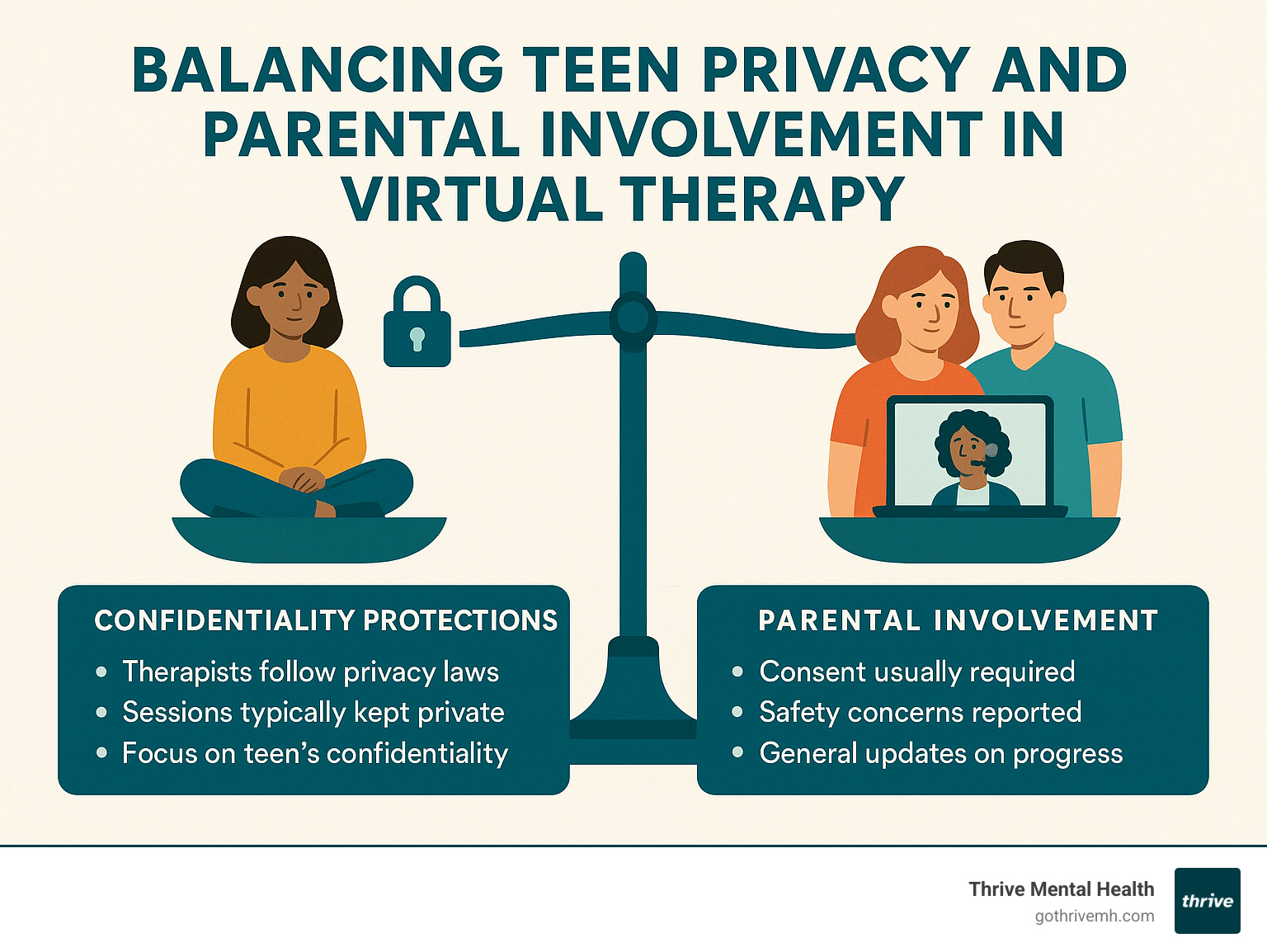Online and Alright: A Teen’s Guide to Virtual Counseling

Why Virtual Counseling for Teens Is Changing Mental Health Support
What is Virtual Counseling and How Does It Help?
Think of virtual counseling for teens as having a heart-to-heart with a licensed therapist through your phone, tablet, or computer instead of in an office. Also called telemental health or online therapy, it delivers the same evidence-based care you would receive face-to-face, just via secure, HIPAA-compliant technology.
How It Works
- Video sessions – similar to FaceTime, but with stronger privacy protections.
- Phone calls – perfect if you are camera-shy or have slow internet.
- Secure messaging – lets you reach out between sessions when writing feels easier than talking.
Why It Helps
- No rides, traffic, or waiting rooms.
- Easy to fit around school, sports, or a part-time job.
- A wider choice of therapists if you live outside a major city.
- Talking from your bedroom often feels safer and less stigmatizing than a clinic lobby.
Research backs teens’ instincts about the format: online therapy delivers results comparable to in-person care.
Why Teens Are Choosing Online Therapy
Today’s digital-native generation often feels more at ease opening up through a screen. Virtual sessions:
- Fit the busiest schedules.
- Feel less intimidating than walking into a new office.
- Remove geographic barriers, giving you access to specialists in anxiety, LGBTQ+ issues, academic pressure, and more.
Studies show that nearly one-third of adolescents would choose virtual therapy over in-person care when given the option.
Common Therapy Approaches You Might Encounter
The same evidence-based treatments used in traditional counseling translate seamlessly online:
- Cognitive Behavioral Therapy (CBT) – identifies unhelpful thought patterns and teaches healthier coping strategies.
- Dialectical Behavioral Therapy (DBT) – builds mindfulness, emotion-regulation, and distress-tolerance skills.
- Family therapy – allows relatives to join from separate devices, making sessions easier to schedule and often more relaxed.
Therapists frequently sprinkle in therapy games and activities to keep sessions engaging and help you practice new skills.
Your Guide to Starting Virtual Counseling for Teens
Stepping into therapy can feel like standing at the edge of a diving board—you know it will help, but the jump is still nerve-wracking. With the right roadmap, you can make the leap confidently.

How to Find and Choose the Right Online Therapist
- Check credentials first. Look for LPC, LCSW, LMFT, PsyD, or PhD.
- Seek relevant experience. Ask, “How long have you worked with teenagers?” or “What approaches do you use for anxiety?”
- Consider shared identity. A therapist who understands your cultural or LGBTQ+ experience can boost comfort and trust.
- Trust your gut. If after a few sessions it doesn’t feel right, let Thrive know and we’ll help you find a better match. Changing therapists is common and totally okay.
For more tips, visit how to choose the right individual online counseling service for your needs.
Understanding Costs and Insurance Coverage
Virtual care is often easier on the wallet than traditional therapy:
- Most insurance plans now cover telehealth at in-office rates, leaving you with a typical copay of $15–$40.
- If you pay privately, sessions generally cost about $150 for individual work and $165 for family sessions.
- You can use HSA/FSA funds, and many employers have Employee Assistance Programs (EAPs) that include free sessions.
Thrive’s team will verify your benefits before you begin so there are no surprises.
What to Expect in Your First Few Sessions
- Intake paperwork – completed online so your therapist can hit the ground running.
- Getting to know you – the first meeting is a conversation about school, friends, family, and what you hope to change.
- Goal setting – together you’ll outline clear, achievable objectives.
- A flexible roadmap – your treatment plan can be tweaked anytime as your needs evolve.
It’s normal to feel nervous. Let your therapist know—acknowledging the anxiety is a powerful first step toward easing it. For a peek at what’s next in the field, explore virtual therapy innovations.
Key Considerations: Privacy, Parents, and Potential Limits
While virtual counseling for teens offers tremendous benefits, it’s important to know how privacy works, what role parents play, and when a higher level of care may be needed.

Confidentiality and Privacy in Virtual Counseling for Teens
Virtual therapy follows the same strict rules as office-based care:
- Sessions run on secure, encrypted, HIPAA-compliant platforms.
- What you share stays private unless there’s risk of serious harm, ongoing abuse, or a court order.
- State laws require parental consent for minors but allow therapists to keep session details confidential whenever safety permits.
More detail: privacy rights for minors in therapy.
The Role of Parents in the Therapy Journey
Parents open the door by signing consent forms, then step back to let teens build their own therapeutic space. They can help by:
- Providing a private, quiet spot for sessions.
- Respecting confidentiality unless safety is at stake.
- Joining family sessions when recommended to improve communication.
For additional guidance, see mental health care online.
When Is Virtual Counseling Not Enough?
Some situations call for more intensive support:
- Active suicidal thoughts with a specific plan.
- Severe mood episodes, psychosis, or eating disorders that require medical monitoring.
- Substance use disorders needing detox or daily oversight.
- No safe, private place or reliable internet for sessions.
Thrive offers Virtual Intensive Outpatient Programs (VIOP) and Partial Hospitalization Programs (PHP) for teens who need more structure than weekly therapy can provide.
If you or someone you know is in immediate danger, call or text 988, message HOME to 741741, or dial 911.
Frequently Asked Questions about Virtual Teen Counseling
When families first consider virtual counseling for teens, they naturally have questions about quality, effectiveness, and privacy. These concerns are completely normal – after all, you want to make sure you’re getting the best possible care for such an important decision.
Let me address the most common questions I hear from teens and parents exploring virtual therapy options.
Are online therapists for teens licensed and qualified?
Absolutely. One of the biggest misconceptions about virtual therapy is that online therapists somehow have different qualifications than traditional therapists. The truth is, legitimate platforms only work with fully licensed mental health professionals who have the exact same credentials you’d find in any therapist’s office.
State board certified therapists working in virtual therapy typically hold credentials like Licensed Clinical Social Worker (LCSW), Licensed Marriage and Family Therapist (LMFT), Licensed Professional Counselor (LPC), or Psychologist (PsyD or PhD). These aren’t abbreviated certifications – they represent the same rigorous master’s or doctoral degree programs, hundreds of hours of supervised clinical experience, and ongoing continuing education requirements.
What makes virtual therapy even more specialized is that many online therapists have additional training in adolescent therapy and virtual therapy techniques. At Thrive Mental Health, our therapists undergo thorough screening that includes verifying licenses with state boards, checking professional references, and ensuring they have specialized experience working with young people.
The vetting process for reputable platforms is actually quite intensive. We verify every therapist’s credentials, require proof of malpractice insurance, conduct background checks, and provide platform-specific training. Many families are surprised to learn that their virtual therapist often has more specialized training in teen mental health than their local options.
Is online therapy as effective as in-person therapy for teens?
This is probably the question I get asked most often, and the research gives us a clear answer: virtual therapy is as effective as traditional in-person therapy for most mental health conditions that teens face.
A 2021 study specifically looked at telehealth family therapy and found comparable outcomes to in-person counseling. Even more encouraging, 70% of teens saw improvement in anxiety or depression symptoms within 3 months of starting virtual therapy, and 80% reported virtual therapy was as or more effective than face-to-face therapy they’d previously tried.
Why does virtual therapy work so well for teenagers? Think about it – today’s teens are digital natives who’ve grown up communicating through screens. For many, talking to someone through a video call feels more natural than sitting across from a stranger in an unfamiliar office. The familiar environment of home can actually help teens open up more quickly and feel more comfortable sharing difficult emotions.
Consistent access is another huge factor. When teens don’t have to worry about transportation, missing school, or sitting in waiting rooms, they’re more likely to attend sessions regularly. This consistency is crucial for building therapeutic relationships and making real progress.
The effectiveness really depends on finding the right therapeutic relationship and ensuring the teen feels comfortable with the technology format. Most teens who struggle with virtual therapy do so because of fit issues with their therapist, not because the virtual format itself is less effective.
Can my parents see what I talk about in therapy?
This is often the biggest concern for teens considering therapy, and I understand why. The short answer is: generally, no – your therapy sessions are confidential, even from your parents. However, the rules around teen privacy in therapy can be complex, so let me break this down clearly.
Therapists follow strict privacy laws, including HIPAA compliance, which means your session content typically stays between you and your therapist. Most therapists work hard to protect teen privacy while keeping parents appropriately informed about general progress – but they won’t share the specific details of what you discuss unless there’s a safety concern.
The exceptions for safety are important to understand. Therapists are required by law to break confidentiality if there’s immediate risk of self-harm with a specific plan, threats to harm others, or ongoing abuse or neglect. These situations are rare, but therapists will always explain these rules clearly at the beginning of treatment.
Parental rights do come into play since parents typically need to consent to treatment for minors. Some states give parents legal rights to access therapy records, but many therapists negotiate privacy agreements that balance safety with confidentiality. The goal is creating a safe space where you can be honest while maintaining appropriate family communication.
In practice, most therapists will provide parents with general progress updates without revealing specific session content. They might say something like “We’re working on coping strategies for school stress” without sharing the personal details you’ve discussed. Your therapist will explain exactly how confidentiality works in your specific situation during your first meeting.
The bottom line? Therapists encourage open family communication but won’t share your session details without your permission unless there’s a serious safety concern. This balance helps create the trust needed for effective therapy while keeping parents appropriately involved in supporting your mental health journey.

Conclusion: Taking the First Step Towards Feeling Better
Virtual counseling for teens has transformed how young people access mental health support, creating opportunities that simply didn’t exist for previous generations. Through this guide, we’ve seen how online therapy breaks down traditional barriers while delivering the same quality care you’d receive in any therapist’s office.
The benefits are clear and compelling. Accessible support means you can get help regardless of where you live or how busy your schedule gets. Effective treatment uses proven therapeutic approaches that research shows work just as well through a screen as they do face-to-face. Private, confidential care respects your need for privacy while keeping you safe. Flexible options adapt to your unique situation and preferences.
Here’s something important to remember: seeking mental health support is actually a sign of strength, not weakness. Think about it this way – if you broke your arm, you wouldn’t hesitate to see a doctor. Taking care of your mental health is just as normal and necessary as caring for your physical health.
You are not alone in whatever you’re facing. Whether you’re dealing with anxiety that makes school feel overwhelming, depression that drains your energy, family conflicts that seem impossible to resolve, or just need someone to help you steer the complexities of growing up, professional support can make a real difference.
At Thrive Mental Health, we understand that every teen’s journey looks different. That’s why we’ve developed flexible, evidence-based programs specifically designed to support young people through virtual care. Our specialized therapists know how to connect with teens and create the safe, supportive environment you need to heal and grow.
We offer different levels of care depending on what you need. Individual counseling sessions provide personalized support that fits around your school and activities. When you need more intensive help, our Virtual Intensive Outpatient Programs (VIOP) offer comprehensive support with multiple sessions per week, group therapy, and family involvement.
If you’re ready to take that first step, it’s completely normal to feel nervous. Starting therapy can feel scary, but remember – the hardest part is often just reaching out. Once you do, you’ll likely find that getting help is much easier and more comfortable than you imagined.
Your mental health matters. Your feelings are valid. And support is available right now, from the comfort of your own home.
The journey toward better mental health can start today. To learn more about our virtual programs and therapeutic approaches, including innovative treatments like art therapy, visit our website or reach out to speak with one of our caring team members. We’re here to support you every step of the way.